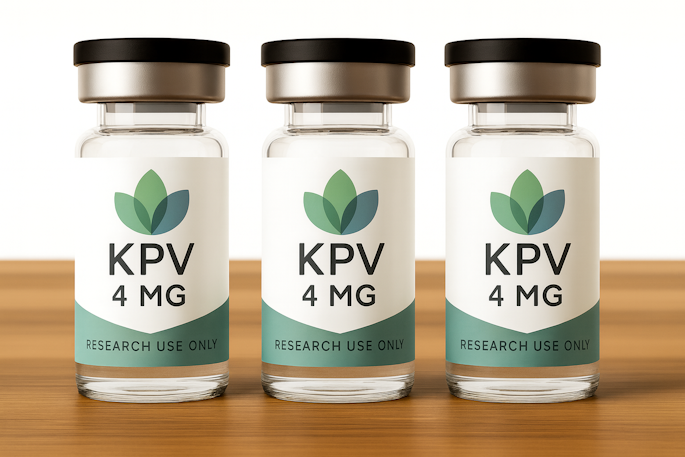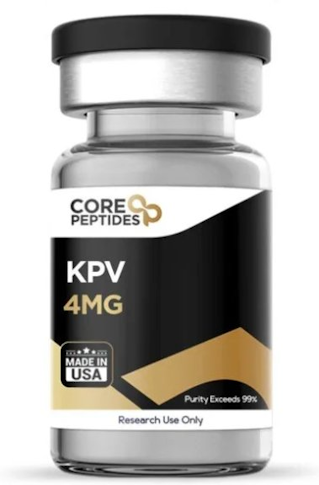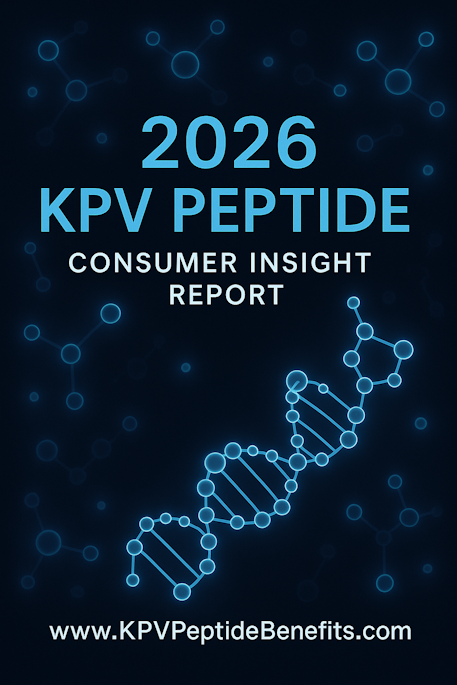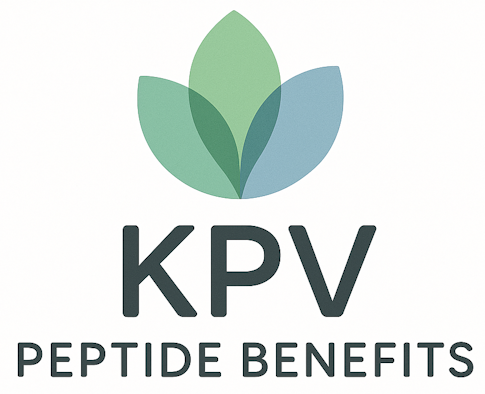KPV Peptide Benefits: Everything You Need To Know

The KPV peptide has gained increasing attention in the field of peptide therapy for its wide range of applications in gut, immune, and skin health. Known for its anti inflammatory properties, this small yet powerful compound consists of lysine proline valine, which are three amino acids that work synergistically to deliver therapeutic effects. Derived from alpha melanocyte stimulating hormone, this naturally occurring peptide plays an important role in modulating inflammatory responses, supporting the immune system, and promoting wound healing.
Researchers have identified multiple kpv peptide benefits, including the ability to reduce inflammation, promote gut health, and improve certain skin conditions. From addressing inflammatory bowel disease to supporting tissue repair, KPV is emerging as a versatile option in the peptide therapy space.
🌿 Big Picture Summary
- 🔬 Discover why KPV peptide is one of today’s most promising compounds for gut health, immune balance, and skin repair.
- 🧬 Derived from alpha melanocyte-stimulating hormone (α-MSH), this tripeptide — Lysine–Proline–Valine — is known for its powerful anti-inflammatory effects.
- 💪 Learn how KPV peptide therapy helps reduce inflammation, support tissue healing, and protect the gut lining from conditions like leaky gut and IBD.
- ✨ Explore its benefits for eczema, psoriasis, and dermatitis, as it helps calm the skin and accelerate wound healing.
- 🧠 Understand how KPV works at the cellular level — regulating cytokines, supporting immune modulation, and promoting overall wellness.
- 📈 Get insights into research findings, dosage recommendations, and real-world applications that make KPV a standout in modern peptide therapy.
➡️ Looking To Buy The KPV Peptide? See Our Top Rated Source Here
What is KPV Peptide?
The KPV peptide is a short chain of just three amino acids, (lysine (K), proline (P), and valine (V), that is naturally found within alpha MSH peptides. It has been shown to influence immune cells and regulate inflammatory pathways by reducing the activity of pro inflammatory cytokines. Its ability to inactivate inflammatory pathways and demonstrate an anti inflammatory function makes it a potent anti inflammatory peptide with significant therapeutic benefits for a variety of chronic conditions.
Because KPV is a naturally occurring peptide, it can be synthesized for oral supplementation or administered through injections under the supervision of a qualified healthcare provider. In laboratory research, it has demonstrated effectiveness against inflammatory processes in the gut, skin, and soft tissues.
To learn more about how it functions at the molecular and cellular level, see our detailed article on what is KPV peptide and its mechanism of action.
The Anti-Inflammatory Power of KPV
One of the main benefits of KPV peptide is its capacity to deliver potent anti inflammatory effects. It acts by targeting inflammatory substances and helping to regulate the immune response. KPV not only helps to reduce inflammation but also offers anti inflammatory benefits that extend to various health conditions involving chronic inflammation.
The anti inflammatory properties of KPV are particularly valuable for individuals dealing with autoimmune diseases, autoimmune disorders, or chronic diseases that stem from an overactive immune system. By influencing immune modulation, it can help manage the body’s inflammatory load and support recovery.
KPV and Gut Health
Many remarkable benefits of KPV are linked to its effect on gut health. This peptide therapy supports gut lining integrity, reduces intestinal inflammation, and protects colonic epithelial cells and intestinal epithelial cells. It has shown promise in addressing leaky gut syndrome and leaky gut by strengthening the intestinal barrier and reducing gut inflammation.
KPV’s ability to address inflammation in the digestive tract has made it a candidate for managing inflammatory bowel disease, including ulcerative colitis and Crohn’s disease. These conditions involve excessive inflammatory responses that damage the gut lining, and KPV’s anti inflammatory function can help protect and restore the tissue.
Some research even indicates that kpv reduces inflammation in cases of mast cell activation syndrome and histamine intolerance, which can be triggered by immune overactivity in the gut.
KPV and Skin Health
Beyond digestion, the kpv peptide benefits extend to skin health. Because the skin is one of the body’s first lines of defense, it is prone to inflammatory processes that can lead to skin conditions such as eczema, psoriasis, and dermatitis. KPV’s anti inflammatory effects can help improve these conditions by calming the skin and promoting soft tissues healing.
By influencing immune function in the skin, KPV supports wound healing and tissue repair. It also aids in recovery after injury, irritation, or environmental damage, making it a valuable addition to peptide therapy protocols focused on skin recovery.
KPV and the Immune System
KPV’s ability to interact with the immune system is one of the reasons it delivers such wide-ranging results. It supports immune function by helping regulate immune cells and moderating the immune response and inflammatory responses. This can be especially beneficial for people with chronic conditions tied to immune dysregulation, such as autoimmune diseases or autoimmune disorders.
By calming excessive immune activity, KPV helps maintain balance while still preserving the body’s ability to fight infections. In peptide therapy, this makes it a valuable option for patients looking to address inflammation without overly suppressing immunity.
KPV Peptide Therapy in Chronic Inflammation
KPV peptide therapy is often explored for those experiencing chronic inflammation, chronic pain, and joint pain associated with health issues or chronic diseases. In these scenarios, the peptide’s potent anti inflammatory actions can help break cycles of tissue damage.
Conditions like muscle soreness from overtraining or injury may also benefit from kpv peptide therapy, as reducing inflammatory markers speeds up recovery. Additionally, individuals dealing with histamine intolerance or mast cell activation syndrome may experience improvements when inflammatory triggers in the gut and skin are addressed.
Other Potential Health Applications
While KPV administered in research settings has primarily focused on gut and skin, there are additional benefits of KPV that may extend to systemic health conditions. For example:
- Supports gut health and may lower risks associated with chronic diseases linked to intestinal dysfunction.
- Helps address inflammation in soft tissues, aiding post-injury recovery.
- May improve resilience in the immune system for individuals prone to frequent infections.
- Works alongside a balanced diet and healthy lifestyle to promote long-term wellness.
How KPV Works
The kpv peptide works through several mechanisms:
- Regulating inflammatory pathways: KPV can inactivate inflammatory pathways responsible for excessive tissue damage.
- Reducing pro inflammatory cytokines: It lowers inflammatory substances that perpetuate chronic issues.
- Immune modulation: By influencing melanocyte stimulating hormone α and stimulating hormone α MSH receptors, it helps keep inflammatory responses under control.
- Protecting the gut lining: Preserves colonic epithelial cells and prevents barrier breakdown seen in leaky gut.
These processes result in anti inflammatory properties that can have widespread therapeutic benefits.
Safety and Professional Guidance
While oral supplementation or topical forms may be available, kpv peptide therapy should always be guided by a qualified healthcare provider. This ensures the correct dosage, form, and delivery method, whether kpv administered orally, topically, or through injections.
It’s important to remember that while the benefits of KPV peptide are promising, more research is needed to fully understand its long-term effects in humans. Most evidence so far comes from laboratory research and early clinical work. For a complete overview of potential side effects and safety observations, see our KPV peptide side effects and safety profile.
For detailed research-based dosage information, view our KPV peptide dosage chart for men and women.
KPV Peptide Research and Clinical Evidence
Scientific studies on the KPV tripeptide, which is found within alpha melanocyte stimulating hormone (α-MSH), demonstrate its ability to calm inflammation, regulate immune activity, and promote mucosal healing.
In preclinical models of inflammatory bowel disease and epithelial tissue damage, KPV reduced pro-inflammatory cytokines, supported epithelial repair, and improved gut barrier integrity.
Additional research in Bull Exp Biol Med and Int J Mol Sci continues to explore its potential role in autoimmune regulation and wound healing.
Frequently Asked Questions
Q: What are the benefits of KPV peptides?
The benefits of KPV peptides include reducing chronic inflammation, supporting gut health, improving certain skin conditions, and enhancing immune function. They may help manage inflammatory bowel disease such as ulcerative colitis and Crohn’s disease, protect the gut lining, assist in wound healing, and calm inflammatory responses linked to autoimmune diseases. KPV also promotes tissue repair in soft tissues, which can benefit recovery from injuries or irritation.
Q: How long does it take for KPV peptide to work?
The timeframe depends on the delivery method, dosage, and the condition being addressed. Some people report noticing benefits, such as reduced joint pain, improved skin health, or relief from gut inflammation, within a few days to two weeks of KPV peptide therapy. For more complex chronic conditions, it may take several weeks of consistent use under the supervision of a healthcare provider.
Q: Does KPV help with weight loss?
KPV is not primarily a weight loss peptide, but by reducing chronic inflammation and chronic pain while improving gut health, it may indirectly support metabolic balance. Lowering inflammatory substances can enhance nutrient absorption and improve overall health conditions, which in turn might make it easier to maintain a healthy weight when combined with a balanced diet and regular exercise.
Q: What is the difference between KPV and BPC 157?
While both KPV and BPC 157 are peptide therapy options known for anti inflammatory properties and tissue repair benefits, they differ in origin and primary focus. KPV peptide is a fragment of alpha melanocyte stimulating hormone and is particularly known for regulating inflammatory responses in the immune system, gut, and skin. BPC 157, on the other hand, is derived from a gastric protein and is more widely studied for soft tissues, ligament, and tendon healing, as well as gastrointestinal protection. In short, KPV is more immune- and inflammation-focused, while BPC 157 is more injury- and repair-focused.
For a full side-by-side analysis of their differences in gut health, inflammation control, and healing, read our KPV peptide vs BPC-157 comparison.
Where to Buy KPV Peptide

For the best balance of price and quality, a 4 mg vial of KPV peptide is available from Core Peptides. Each vial costs $38 and is designed to focus on gut and skin health, support a stronger immune system, and help alleviate chronic inflammation.
Use code SAVE10 at checkout to receive 10% off your order, here’s a link to their site to learn more.
Final Thoughts
The remarkable benefits of the KPV peptide make it an exciting option in modern peptide therapy. By combining the strength of lysine proline valine with the natural signaling of alpha melanocyte stimulating hormone, KPV offers potent anti inflammatory and immune-balancing effects.
Whether used to manage inflammatory bowel disease, protect gut health, promote skin health, or improve immune function, the anti inflammatory benefits of KPV are clear. From reducing gut inflammation to enhancing tissue repair, this potent anti inflammatory effects peptide is poised to play a growing role in future peptide therapy applications.
By working closely with a healthcare provider, individuals may be able to leverage KPV to address inflammation, improve immune system balance, and support overall wellness.
Researchers or qualified professionals seeking verified sources can visit our guide to buy KPV peptide online from trusted vendors.
2026 KPV Peptide Consumer Insight Report Now Available
Our team has released a comprehensive 2026 KPV Peptide Consumer Insight Report, designed to help readers better understand how this peptide is discussed across gut-health research, inflammation-related conversations, and emerging peptide-science communities.
This long-form educational resource explores:
- Search-trend patterns and rising interest surrounding KPV heading into 2026
- How KPV is described in non-clinical literature related to gut health, inflammation pathways, and immune-response modulation
- A clear, accessible breakdown of terminology often used in discussions about KPV, including benefits, safety considerations, side-effect awareness, and consumer-reported questions
- Buying-behavior themes and the shift toward research-driven education rather than anecdotal claims
Readers can access the full report by clicking the button below:

